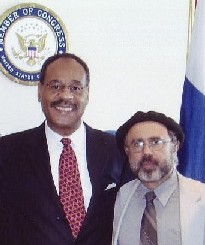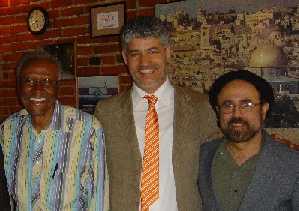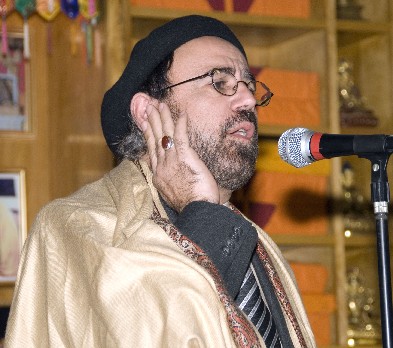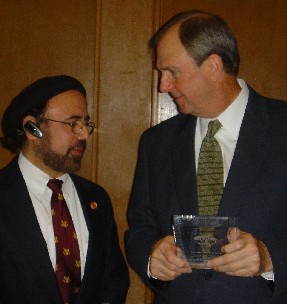|
|
| Ahmed
El-Sherif
email: el-sherif@betachem.com

Congressman Emanuel Cleaver II and Ahmed following a meeting in Congressman Cleaver's office. 
Then Mayor Pro Tem Alvin Brooks, an Italian guest, and Ahmed following a dinner at the Jerusalem Cafe. 
Ahmed giving the Adhan at an interfaith observance at the Rime Buddhist Center. 
Ahmed receiving a CRES 2008 Thanksgiving award from CRES chair Joe Archias. |
Ahmed
El-Sherif was born in the Sinai and came to the United States in 1979.
He became an American citizen in 1985. He has three remarkable children,
a daughter and two younger sons.
A scientist in medicinal chemistry, he is president of BetaChem Inc., a life science laboratory, which he began in 1993. Founder of the American Muslim Council of Greater Kansas City, an organization involving Muslims in mainstream American political life, Ahmed participates in various national and international conferences and organization, such as the UN summit in Copenhagen about social and economic development. He was one of the organizers of the International Conference of Parliamentarians in Belgium on the genocide in Bosnia. He coordinated a conference on the Rights of Children with former mayor of Kansas City, Dr. Charles Wheeler. As a graduate student, he served the Muslim communities as imam in Tuscon, AZ (where he was also president of the Islamic Center), Jonesboro, AR (where he founded the Islamic Center and served as its president), and Davis and Sacramento, CA. He has been active with Heart to Heart International, and also is founder and president of Shifa International, a humanitarian organization specializing in the sending of medical relief to various places in the world. El-Sherif has been instrumental in distributing needed medicine to places such as the Ukraine, with personal trips to Iraq, Egypt, Jordan, the West Bank and Gaza, Bosnia, and Afghanistan for over twenty years. When black churches in the South were being burned, he organized an interfaith effort in Kansas City to raise money for their reconstruction. He has provided hospitality for foreign visitors, including Israeli officials interested in dialogue for peace. His interfaith activities are numerous. For example, in 1999 he hosted Joel Lavi, Jewish mayor of Kansas City sister city Romle, Israel, Arab city councilman Michael Fanous, and others in his home during their visit here. In 2000 he convened an interfaith panel at Johnson County Community College for visitors from Israel, the Gaza Strip, Jordan, and the West Bank, in cooperation with the International Visitors Council of Greater Kansas City. He has appeared in many interfaith forums, including the Kansas City Interfaith Council's recent "Gifts of Pluralism" conference. In 2000, he was given the Bodhisattva Award for his humanitarian and interfaith work by the Rime Buddhist Center and Monastery. In 2008, the World Faiths Center for Religious Experience and Study honored him with an award saying his "local and global humanitarian and interfaith work, and leadership within his own faith, bring the world closer to peace." Barbara Dolci, Executive Director, International Visitors Council of Greater Kansas City, one of many community leaders who are grateful for his contrubutions to our city, says, "Ahmed El Sherif has been an active member of the board of directors of the International Visitors Council since 2004. Mr. El Sherif is an incredible citizen diplomat as he arranges appointments and hospitality with international visitors from predominately Muslim countries. Ahmed represents his faith, heritage, and his American citizenship as he respectfully embraces the interfaith and international community. Ahmed is a valuable member of the International Visitors Council and enjoys bridging the cultures and religions on common grounds of respect and understanding." Sample press
clippings below.
|
| The Kansas City Star
March 24, 2004 Muslim leader reaches out to all faiths
From Kansas City to Bosnia, Ahmed El-Sherif reaches out to people of all backgrounds. El-Sherif, 48, is a leader in the Muslim community and encourages interfaith dialogue. He speaks at many forums, organized the first interfaith conference in Kansas City, co-organized the International Conference of Parliamentarians that 200 countries attended in Belgium and co-organized a conference in Kansas City on children's rights. The Leawood resident's humanitarian efforts include helping refugees who have resettled in the United States, as well as sending medical relief abroad as founder and president of Shifa International and through Heart to Heart International. He has traveled to Iraq, Egypt, Jordan, the West Bank, Gaza, Bosnia and Afghanistan. He hopes to take medicine to Iraqis and Palestinians by the end of the year. He also has opened his home to foreign visitors, including Israeli officials interested in a dialogue for peace. In addition, he is president of his own pharmaceutical research and development firm, Beta Chem Inc. "I cannot help but get involved," El-Sherif said of his outreach. His experience as a refugee is one reason for his involvement. Born in Sinai, a part of northeastern Egypt, he fled to Cairo with his family during the War of 1967 when he was 11 years old. As a result, El-Sherif sees diversity as a gift to be celebrated, said David Nelson, a retired Lutheran minister who has worked with El-Sherif on interfaith activities. El-Sherif came to the United States in 1979 for graduate school. While at the University of Arkansas and the University of Arizona, he brought the Muslim communities together and encouraged interfaith dialogue. At the same time, he embarked on humanitarian efforts. He traveled to Afghanistan while still a graduate student. He moved to the Kansas City area in 1989. In the early 1990s, he founded the American Muslim Council of Greater Kansas City to give Muslims a voice and bring members to the mainstream. He also became involved in Heart to Heart International. Barbi Moore, senior vice president of international programming, has worked with him since the organization's formation in the Kansas City area. He has had a big impact on the organization, said Moore, who now works at the Oklahoma City office. She was impressed with his dedication to make sure everyone in need received help, not just Muslims, when the group provided medical supplies to victims of the Bosnian war in 1993. His local interfaith efforts include organizing Kansas City churches, mosques and synagogues in the mid-1990s to send assistance to rebuild black churches in the South that burned. After Sept. 11, 2001, El-Sherif found his role as a spokesperson for the Muslim community becoming more important. But his message did not change. "We live in a time in our history when communication and distance became shorter," he said. "Unless we learn to respect one another, we could have an unhealthy environment." Nelson said El-Sherif had an impact the year following Sept. 11 when they traveled to Lindsborg, Kan., where there is not a Muslim community. "He just presented such a positive and very articulate presentation," Nelson said. "People really began to open their minds and hearts." Vern Barnet, president and resident minister of CRES (Center for Religious Experience and Study), said people relate to El-Sherif because he speaks from the heart. "Although he has a vast knowledge of his faith, he's able to communicate it in very human terms," Barnet said. El-Sherif has continued to support refugees. Ahmed Rizvanovic, a victim of war, came from Bosnia to Kansas City for surgery in 1994. El-Sherif met Rizvanovic in the hospital, and the two remain close. Rizvanovic lived with El-Sherif while he recuperated and adjusted to his new life. Now Rizvanovic is 30 years old and lives in Kansas City, Kan. "I know him like a big brother, like family," said Rizvanovic, who also got to know El-Sherif's three kids: Fatimeh, 20; Yusuf, 18; and Zakaria, 16. Art Chaudry, who is involved in the Muslim community, said El-Sherif's charity stands out. "He is very selfless in his pursuit of the many goals he is involved in," Chaudry said. ROLE: Leader in the Muslim community ACTION: Organized the first interfaith conference in Kansas City, co-organized the International Conference of Parliamentarians in Belgium and co-organized a conference in Kansas City on children's rights. He has helped refugees in the United States, and sent medical relief abroad as founder and president of Shifa International From Kansas City to Bosnia, Ahmed El-Sherif reaches out to people of all backgrounds. El-Sherif, 48, is a leader in the Muslim community and encourages interfaith dialogue. He speaks at many forums, organized the first interfaith conference in Kansas City, co-organized the International Conference of Parliamentarians that 200 countries attended in Belgium and co-organized a conference in Kansas City on children's rights. Copyright 2004 The Kansas City Star Co. |
| http://www.kansascity.com/618/story/482007.html
Beloved uncle served as a
model for peaceful co-existence
Kamel Al-Sherif was a world citizen working for peace. He was also my uncle. He lived in Amman, Jordan, but was a world traveler. He died in late January, in his mid-80s, of a stroke. Al-Sherif lived his life with a great vision, a vision of coexistence between people of different faiths, races and cultures. His was a vision that respected people for who they are. And he worked hard to maintain it. In fact, he lived his full life advocating for that cause. I remember him from my early childhood, how he conducted himself and how he related to others through difficult times. I remember how he met with others who might have disagreed with him with such kindness. Among his credits were his tours of duty as the Jordanian ambassador to Germany, China, Japan and several countries in Africa. He was a writer, poet, teacher and mentor. He found ways to help the poor in various parts of the world by helping to establish world relief organizations such as the International Islamic Council based in Cairo. He also affected friends here, in Kansas City. I shall miss him as a leader. And I shall miss him like a father. He may have left this life physically, but he left behind a legacy to follow. I would meet up with him at various conferences . . . in Amman, in Rome, in Copenhagen, in Brussels, in Cairo and in Washington, D.C. When he led discussions with leaders of different faiths, it was always with such kindness and in such a manner that he reminded me of our Prophet Muhammad (peace be upon him). Uncle Kamel would advance his perspective while listening respectfully to other views. His style of leadership and his style of dialogue engendered goodwill among all who encountered him. I see a great need for that sort of style in our lives today. Uncle Kamel’s style of leadership and dialogue is needed to help solve the world’s violence. Being inspired by him and his leadership, I was able to build bridges with leaders of other faiths in my region of the world. Along with several others, I was preparing a conference in Amman around the theme, “The Dialogue of Civilizations,” for which he would have been our guide, when the news came of his death. Persons come to this life and then they go. Some leave behind a positive effect that will last longer than their own lives. Kamel Al-Sherif would, indeed, be of this category of people. I learned from him how to live with others of different faiths with respect, while maintaining my own. Think how much this quality is needed today. I cannot help but cry and wipe my tears. Yet I also cannot help but be more determined than ever to keep his legacy and style alive. It is much needed today to have a better world. Ahmed El-Sherif is founder of the American Muslim Council of Kansas City. He lives in Leawood. |
| March 25. 2002
Weariness blurs activist's view of his influence By MARY SANCHEZ The Kansas City Star The Muslim man is apologizing. "I'm sorry," he says, "I just cannot comment right now." These are the first fitful hours of the war on Iraq. Reporters are culling their contacts, seeking viewpoints for the next edition. For years the man has been a stellar news source, passionate and articulate. Through the weekend, the war rages on. The man's silent resolve steadies. "I am just sitting in my home, feeling numb," he said. "I feel I can only shut my door and pray." The man's fears are appearing on the foreign and domestic telecasts he watches: bodies of American soldiers displayed on Middle Eastern TV, Iraqi civilians slaughtered, friendly fire plummeting a British pilot to his death and the unknown fate of captured U.S. Marines. "I feel like I have failed miserably," he says in a conversation he will share, but not from his usual role as an often-quoted peace activist. Today he wishes to be just another American living in a Kansas City suburb, trying to raise his family and to keep his business afloat. "I worked so hard over the years trying to build bridges," he said, "but what is happening is equally powerful, maybe more...." His voice trails off. His was not the work of a one-time rally attendee. He spoke on national television news shows, sat on countless panels, lobbied members of Congress in Topeka, Jefferson City and Washington, D.C. He organized missions to bring medical supplies and other aid to Bosnia and Iraq. He gave countless speeches to schools and civic groups. "I feel like our moral conduct is not growing up with our technology," he says of America. "Our world is getting smaller, and we really need to recognize and hear one another." The man is from the Middle East and of Arab descent. He came to the United States decades ago seeking an advanced education at an American university, like many foreigners do. He decided to stay, later becoming a United States citizen. Today his comments about "our forces" and "our administration" reflect that decision. He speaks as a loyal American, but one with a world viewpoint. It is the crux of his distress. "War affects people," he said. "Ordinary people get lost in the midst of all of this." By the time he was a teen-ager, the man had been through three wars. "By then I had had enough of war and said, `Let me go to America,' " he said. " `There are no wars over there.' " He liked that Americans had elaborate systems for retirement, a concept not prevalent in his country. "If every seven years there is another war, your lives are constantly put on hold," he said. His present weariness did not begin with the war on Iraq. He was devastated when a coalition fell apart about two years ago between local Muslim, Jewish and Palestinian leaders. He became physically ill to know Sept. 11 was the work of extremists twisting his Muslim faith. The man knows his thoughts at that time were not logical, but that didn't diminish them. "I came here to get away from all of this, and I felt personally guilty, that I brought this here," he recalled. A friend counseled, " `No, it is not you, the world is just getting smaller.' " The man maintains shreds of optimism. He hopes that the war will stabilize the Middle East, that it won't spread to other countries and that it will end the sanctions on Iraq. "We have angered the world," he said. "Maybe I just did not work hard enough." Sometimes those who have been the most effective, persuasive and politically astute lose hope. Or, maybe it is simply that their work is done. What the man does not realize, could not humanly calculate, is how many people he has inspired. People who may read one more book, listen to one more foreign broadcast or counter one more nasty sentiment about another's religion because of him. Last week, the man counseled a budding college journalist to listen as closely to those who are pro-war as she listens to the pro-peace opinions she finds more palatable. Activists grow weary. But the really good ones leave
footprints.
|

http://www.kcjc.com/200910168796/news/local-project-aims-to-help-children-in-gaza-israel.html |
Local project aims to help children
in Gaza, Israel
FRIDAY, 16 OCTOBER 2009 11:00 Photo by Edmee Rodriguez: Ahmed El-Sherif (left) and Sam Nachum have cooperated on the new project. It was earlier this year at the Jewish Community Campus, as Israel’s Consul General to the Midwest discussed the smoldering mini-war between the Jewish state and the Gaza-based Islamist militant group Hamas, that the overwhelmingly Jewish audience booed Ahmed El-Sherif for daring to ask a critical question. Sam Nachum, a Jew born in Jerusalem to Iraqi refugees, felt empathy for the Egyptian-born man of Palestinian-refugee heritage, so he reached out to El-Sherif by phone the next day. Rather than sink into despair, they decided to accentuate the positive and try to bring some cheer into the lives of children on both sides of the Israel-Gaza border. Their joint efforts since that time, aided by about 40 other volunteers, has been building to a public launch event set for Thursday, Oct. 22, at which donations of new toys are being solicited. (See below for details on the two-part kickoff.) El-Sherif had previously worked with the local humanitarian organization Heart to Heart International on a Gaza-aid project back in the 1990s, and so he reached out to its founder, Dr. Gary Morsch, for help with the project that has come to be known as “Let the Children Pray for Peace.” Morsch has offered one of his non-profit organizations as a conduit for donations while Nachum and El-Sherif get LCPP established as its own charitable entity. The late local attorney and peace activist, Allan Abrams, was working on that when he died earlier this month, organizers say. Something positive
Dana Nachum, Sam’s wife, has also been working on the project, and she notes the diversity of the organizing committee members, who also include Dr. Rauf Mir, Nick Awad, Elizabeth Alex and Michael Tabman. “We have Jews, Muslims, Buddhists, Christians, atheists, Quakers, a Catholic nun,” she said. “We have people from Pakistan, India, Jordan, Palestine …” “Usually, when people go down to the Plaza, they are protesting something, or we are protesting something,” Sam Nachum said. “This is the first time the two groups (Ed. note: Jewish and Arab) are getting together for something positive.” “We need something positive, because there is so much negativity in the atmosphere,” said El-Sherif. The Nachums (Sam and Dana’s son, Ben, is also involved) and El-Sherif say they will take the donated items and deliver them to needy children in Sderot, Israel, and Gaza City. Sam Nachum says Sderot officials have been receptive to his offer of donated playthings. The organizers hope to visit the region in March, when their donations are to be delivered. Nachum says it’s important, from a cultural standpoint, for people to donate new, and not used, toys and equipment. Launch set Oct. 22
At 6 p.m. Thursday, Oct. 22, area residents, and especially young people, are invited to gather at the Sister Cities Bridge near the corner of Ward Parkway and Central Street for a “Stand for Peace” candlelight vigil. Donations of toys, kites, sports equipment and school supplies will be accepted at both of the kickoff events. For more information on the project or the kickoff
event, visit www.letthechildrenplayforpeace.org or e-mail: letthechildrenplayforpeace@gmail.com
.
|
Holy Spirit of Friendship,
Who draws us together -- sometimes in unexpected
ways,
we give thanks for our friend Ahmed and his family,
* for his service in the cause of interfaith understanding
here, across the nation, and around the world,
* for his courageous efforts here and abroad to
relieve human suffering,
* for his gift of pharmaceutical chemistry for
healing medicines,
* and for his award-wining teaching,
though, alas, now made to come to an end, and
* for bringing him and us through a time of trial
with imperfect justice but sufficient wisdom
to keep him and his family and us together.
Thus we offer our thanks for his unfailing hospitality,
and happily renew the community of friends
in the blessing of this home making us all grateful
in what ways we can to offer our service
for a more just and verdant world.
Salaam, Shalom, Shantih, Peace.
Mar 16
Dear Friends--
Ahmed and I and two other friends visited Congressman Emanuel Cleaver today for his advice in planning a trip to the Middle East.
Ahmed must wear large shoes because his feet are swollen and we walks with an imbalance, but feeling is returning to the damaged side. He is in good spirits and eager to promote the cause of human understanding and peace.
Vern
Mar 11
Dear Friends--
We expect Ahmed
to return early this week to Kansas City!
Thanks for
everyone's prayers, to Yolanda, to his amazing children!
Vern
Mar 9
Dear Friends--
Ahmed just called. He is making rapid progress, out of the ICU. He walked a bit today. He is looking forward to returning to KC, although just when is not decided, and will undergo physical theapy here. He completed his project before the accident, and the company is giving him additional work and appreciation. Let's keep praying for his rapid recovery and for him and his family as they move ahead from this very difficult incident.
VernMar 8
Dear Friends--
Fatimah called
a short while ago from the hospital near Ft Collins. I also spoke with
Yolanda. We now know that Ahmed's incident was caused by exposure to chemicals
with which Ahmed was working. His condition has markedly improved, but
it may take months of therapy for full recovery
since he was
lying on one side for so long before he was discovered and damage occurred.
His kidneys are working hard and improving as the chemical is being flushed
from his body with hydration. He can speak well. He may be in ICU for several
more days, then in a regular room. Fatimah thanks everyone for their continuing
prayers.
Vern Barnet